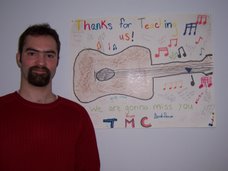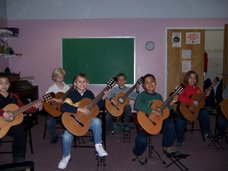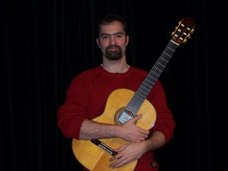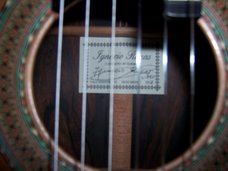
A photo of Jesse Crites, Ray, Marshall, Kevin, and me. Jesse is on the far right.
Jesse Crites is a guitarist and teacher currently residing in Chicago. He is a student of Denis Azabagic working on his Master's Degree at Roosevelt University.
MCM: Jesse Crites could you give us a brief synopsis of your career starting with your early playing.
JC: At first I was self taught. I watched my father play electric guitar for many years. I finally got the guts to ask for lessons when I was 13. I took electric guitar lessons at a guitar store around the corner called Music and Arts. My teacher’s name was Bruce, he was a good teacher. He did everything by ear, rock, finger-style and jazz. He also gave me my first introduction to classical guitar. He was trained in finger-style and he just gave me a hint of classical training. By my senior year in high-school I had played jazz band for a couple of years and cello in the youth orchestra for 8 years. I also played in a rock band, and actually got really bored with the electric guitar at that point. My orchestra teacher told me to see a concert at the Kennedy center in Washington DC. The performer was Kevin Vigil and his wife. This was the first classical guitar concert I attended. After the concert I approached him and asked for lessons. That is how I got started with the classical guitar.
MCM: How old were you?
JC: I was 17 years old.
MCM: 17 years, interesting. How did you get to Chicago from there?
JC: I had two months to prepare an audition for college?
MCM: Only two months to prepare! What did you play?
JC: I played a Brouwer study #6 and Carcassi Etudes #3 and #7. I think that was it, it was a long time ago.
MCM: That’s incredible, only two months. You were able to get into college on the strength of your audition after only two months of classical guitar?
JC: Well I had a lot of musical training up to that point.
MCM: I would have thought that the technical side would be the most difficult.
JC: Well I got into all three schools I applied for. One was in Greensboro the other was Virginia Commonwealth University, and Shenandoah University. I went to Shenandoah and studied under Dr. Glen Caluda. A great guy and a good performer as well. He opened a lot of doors for me. He said that it was an easy school to get into, but really hard to graduate from and he was right. It took me four and a half years to get through the program. Of course my reading was really weak and my technique was poor, but after two years I felt like this was definitely the right decision. I at first thought I would be a musical therapist, but decided to be a classical guitar performer instead. I took a semester off and studied with Berta Rojas, a graduate of Peabody. She prepared me for my senior recital. In 2004 I audition for Jason Vieux at the Cleveland Institute of Music. At first I was on a waiting list, but I got bumped off of it. In February 2005, I auditioned for Roosevelt University after meeting Denis Azabagic at the Alexadria Guitar Festival in Virginia.
MCM: Was he playing at the festival?
JC: Yes he played a split concert that night.
MCM: So you met Denis there. After you saw him play did you know you wanted to study with him?
JC: Yes, definitely.
MCM: Me too he blew me away.
JC: Tremolo was the technique that was giving me trouble at that time, and when I heard him play tremolo. It was the most fluid, beautiful sound I have ever heard.
MCM: Yes, his tremolo is brilliant. I can think of maybe one or two players with similar tremolo but no more.
JC: Also, he had a slip up during the concert, but it was an incredible slip up. He played a series of five pieces composed by Vojislav Ivanovic, who I believe was his teacher for a time, called the Café Pieces. After he played the second piece he stopped and apologized because he had played the pieces out of order. It struck me how perfectly he had played, yet sometime in the middle he knew that he had made a mistake. Yet he still played so perfectly. Also, at the end of the recital he was very approachable. This festival had a wine and cheese reception after every concert, and I met him there. He was very kind and he told me about an opening at Roosevelt.
MCM: Very interesting. Ok can we go back and talk about your early teaching?
JC: My first teaching job was the Shenandoah Conservatory Arts Academy.
MCM: How did you get that position?
JC: My teacher Dr. Caluta told me of the opening. It is a great school located in an old historic building. It was a good job because it was associated with the University and taxes and students were all taken care of by school. Looking back on it I bombed as a teacher many times. At first I had only about five students. It felt like a struggle every time I taught. You know, trying to teach something they are interested in and making sure they got what they needed. At that point I knew about technique and I knew about repertoire, but I had just learned it. It was still difficult for me to find problem in someone’s playing. Once I found them, how did I fix things? My first teacher Kevin told me that I would look back and think, “Gosh I could have done that better.” He also told me that it happens to everyone and to suck it up and continue on.
MCM: This is a problem that occurs for many teachers young and old, including me. You said that at first you felt like you bombed as a teacher. At this time did you have a lot of turnover? Was it difficult to keep students?
JC: I have always been able to keep students. I’ve known from the very beginning that communication with the parents is very important.
MCM: So at this point you had mostly young students?
JC: Oh yes, mostly young students. I have had my share of adults too, but adult students are different. At first I had problems with adult students but I now enjoy teaching them. Keeping students was never a problem, but making it worth the while of the student and me was a challenge at first. I also wasn’t making much money, only $23 an hour. It sounds pretty good as a part-time job. At the beginning you have to really take what you can get. The pay might not be worth it but it will pay off in a long time. I had an ADD student and his older sister was also a student of mine. She was more intelligent than I was ready for at the time, and after six months or so she quit. Unfortunately, the kid ended up being moved from teacher to teacher but I was the only one who kept him for over a year. You know after two and a half years I had some long term students and I started looking into methods. The best one I came across at the time was the FJH Young Beginners Student. It covers almost everything and if you are transitioning from electric to classical it is a great series to use. It is applicable to finger-style technique and plectrum playing. It is progressive and easy to use. I wouldn’t use it now, but for the time I used it to set up a progressive program. It has theory, chords, and repertoire as well.
MCM: So you were there for two and half years?
JC: Yes after that time I quit and moved to Chicago.
MCM: Excellent, the perfect transition. Can you tell me about your teaching now in Chicago?
JC: Well first I also taught at a couple of schools when I took a hiatus from school before I got to Chicago. I taught at Falls Church Music Conservatory, I feel I was the best teacher there. It was a bum school, but I had amazing students. I gave my students two months notice and the school only two weeks. The school got angry because a parent leaked it, but I felt my students deserved better. I also taught at Contemporary Music Center in Haymarket Virginia. It was an awesome school that happened to pay poorly.
MCM: Were these jobs only classical or did you teach everything.
JC: At music shops like these you take whatever they give you. It is not a great thing, but it gives you the experience to get to the next level. If anything it tells you what to look for in your students.
MCM: In Chicago?
JC: The first thing I did was pick up a phone book and call every single music school in Chicago. Except for anything that looked like a music store, those were a last resort for me. Most places didn’t have anything. I also looked at websites like Craig’s List and Chicago Reader.com. I finally stumbled on flyer for a school called For Strings Music on a bulletin board in Roosevelt University. This place is great. They had never had a classical guitar program, so I get to do anything I want. They paid for everything I asked for. They have great links on their site. Also, they do not want electric guitar students there. Anything and everything I want they get for me. It is really excellent. I have had sixteen students there and lost only a few of them who went to college. I also taught at the University of Chicago Laboratory School. I’ve also refused a few jobs because they were too far away or paid too little. As you know some places are not good to further your career.
MCM: What about your own studio?
JC: Yes the other part of my teaching is through my daily life. Networking and advancing my own ideas to get my name out there as a teacher. If you put your name out there everywhere you go tell people who you are and drop cards everywhere you go you will get results. Invest in cards, it is very important. Cards are a very easy way to get your name out there. The most important thing when you create your own studio is having a place to teach. One thing you can do is teach at students houses. It is difficult. It takes a lot of time out of your day, and a lot of set up time. I recommend charging more for it, but having some prescribed pay-scale for the teaching is a bit better.
MCM: Great, now can you be more specific in terms of how started your studio. I know you have a successful studio and I am very impressed with it. Still, for young up and coming guitarists who have never done it, the world can be a scary place. This blog is for them, and I think your experience will benefit them greatly.
JC: It doesn’t matter how much experience you have when you move to a new area. I was scared and unsure of my ability to acquire students. I was never unsure of being able to keep them once I had them.
MCM: That kind of confidence is a big boon for a teacher. Some teachers will be unsure of both of those aspects of teaching.
JC: Overall one of the biggest factors was luck. I hate to admit it, but it is true. I moved to a culturally rich area that lacked classical guitar teachers. The biggest thing was probably networking through my daily and weekly activities.
MCM: Can you give an example?
JC: Well one of the first things I did was frequent Coffee shops. One in particular I go to a lot. When you walk around with a guitar on your back, people ask questions. So I tell everyone I can that I teach and go to school, and most people are intrigued.
MCM: This is part of your daily life right. It is not like you are going around to coffee shops trying to chat people up right?
JC: No, no I go to school and I teach so I am always walking around with my guitar. I have built it into my routine. Networking through daily activities, church, social events, fairs and cultural events are great networking events. Community involved events are the best way to get known in your area. All you really need is one good student. Also you need a good relationship with the parents. From this word of mouth spreads over a two or three month time period. This is the best way to mushroom your career. The child is not going to go around and tell them how good of a teacher you are, but the parents will.
MCM: Can you give a specific example?
JC: I worked at the UIC laboratory school. So I was walking through the hallway after school, and parents would see me with the guitars. So the first student I had was Mia Rutter and she saw me holding the guitar and we started a conversation. I started teaching her and from there she told a couple of other people who told other people and the rest is history.
MCM: Have you received help from teachers you have had?
JC: Yes some years ago Dr. Calut helped me out. The best thing teachers have done is connect me with some opportunities. Still, you have to win the job the teacher cannot get it for you. Referrals do happen often though.
MCM: Jesse Crites thank you very much for your time.
JC: My pleasure, thank you.





4 comments:
Spelling corrections
Dr. Caluda
Kevin Vigil
Falls Chcurch Music Conservatory
The comment on Dr. Caluda's playing was taken out of context. He is a great player but does not perform frequently. It is not ment to say that he is a poor player.
"Outfit Events continue to get some of the best entertainment in the country to perform live at our events in Chicago.
"
Your blog keeps getting better and better! Your older articles are not as good as newer ones you have a lot more creativity and originality now keep it up!
that's brilliant blog for music education.Guitar Lessons is so good.
Post a Comment